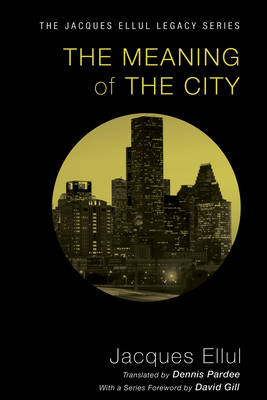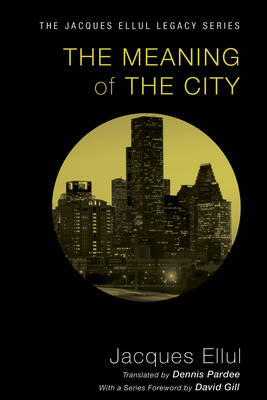
- Retrait gratuit dans votre magasin Club
- 7.000.000 titres dans notre catalogue
- Payer en toute sécurité
- Toujours un magasin près de chez vous
- Retrait gratuit dans votre magasin Club
- 7.000.0000 titres dans notre catalogue
- Payer en toute sécurité
- Toujours un magasin près de chez vous
28,45 €
+ 56 points
Description
Jacques Ellul, a former member of a Law Faculty at the University of Bordeaux, was recognized as a brilliant and penetrating commentator on the relationship between theology and sociology. In the Meaning of the City he presents what he finds in the Bible--a sophisticated, coherent theology of the city fully applicable to today's urbanized society. Ellul believes that the city symbolizes the supreme work of man--and, as such, represents man's ultimate rejection of God. Therefore it is the city, where lies man's rebellious heart, that must be reformed. The author stresses the fact that the Bible does not find man's fulfillment in a return to an idyllic Eden, but points rather to a life of communion with the Savior in the city transfigured. The Meaning of the City, says John Wilkinson in his introductory essay to the book, is the ""theological counterpoint"" to Ellul's Technological Society, a work that analyzed the phenomenon of the autonomous and totally manipulative post-industrial world. Ellul takes issue with those who idealistically plan new urban environments for man, as though man alone can negate the inherent diabolism of the city. For Ellul, the history of the city from the times of Cain and Nimrod through to Babylon and Jerusalem reveals a tendency to destroy the human being for the sake of human works. Nevertheless, continuing the theme of the tension between two realities that characterizes all his works, Ellul sees God as electing the city as itself an instrument of grace for the believer. William Stringfellow describes The Meaning of the City as a book of ""startling significance,"" which ""should rank beside Reinhold Niebuhr's Moral Man and Immoral Society as a work of truly momentous potential."" Douglass D. McFerran adds that it is ""a book worth serious consideration by anyone interested in the relationship between religious commitment and secular involvement."" And John Wilkinson sums it up: ""There are very few convincingly religious analyses of the sociological phenomena of the present day. . . . Ellul's biblically based sociology is today furnishing the matter for a large and growing group of social protestants, particularly in the United States.""
Spécifications
Parties prenantes
- Auteur(s) :
- Traducteur(s):
- Editeur:
Contenu
- Nombre de pages :
- 230
- Langue:
- Anglais
- Collection :
Caractéristiques
- EAN:
- 9781606089736
- Date de parution :
- 17-06-11
- Format:
- Livre broché
- Format numérique:
- Trade paperback (VS)
- Dimensions :
- 140 mm x 213 mm
- Poids :
- 294 g

Les avis
Nous publions uniquement les avis qui respectent les conditions requises. Consultez nos conditions pour les avis.






